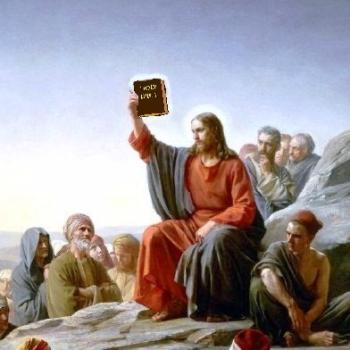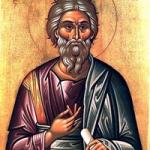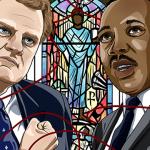Today is graduation day at Providence College, where I just finished my thirtieth year on the faculty. It also happens to be Ascension Sunday. I have never had the privilege of addressing the graduates on their special day; if I did, I would say something like this:
Ludwig Wittgenstein was one of the most important, yet enigmatic and difficult, philosophers of the 20th century. The family into which he was born was fabulously wealthy, one of the most successful families in fin-de-siècle Vienna. Ludwig was the youngest of nine children; one died in her youth, and the three oldest sons all committed suicide. The other remaining son, older brother Paul, was a concert pianist who lost his right arm during World War I, after which he crafted a highly successful concert career playing pieces written by the great composers of the day for the left hand only. Ludwig, Paul, and their three remaining sisters all suffered from various psychological ailments and considered suicide at various times in their lives. The Wittgensteins were both outrageously successful and spectacularly dysfunctional.
Although considered to be a genius by almost everyone other than his family who knew him, Ludwig had a very difficult time deciding what to do with his life. Talented in engineering and mathematics, he showed great promise in the burgeoning field of aeronautics while at Cambridge University in 1911 at the age of 22. Yet his heart wasn’t in it, and Ludwig attached himself to Bertrand Russell, the most famous philosopher of his day in the English-speaking world, wondering whether philosophy might turn out to be his true passion.
Despite Ludwig’s abrasive and neurotic personality, Russell humored him to the point that one day Wittgenstein asked Russell: “Will you please tell me if I am a complete idiot or not?” Russell replied, “My dear fellow, I don’t know, why are you asking me?” “Because,” Wittgenstein said, “if I am a complete idiot I shall become an aeronaut; but if not I shall become a philosopher.”
Ludwig finds himself in a predicament that all of us face at times, one that is facing all of you today. A choice, often an important one, must be made and we need help making it. Do I play it safe or take a risk? Do I continue on a familiar path or take “the road less traveled”? Do I end a relationship or hang in there for a while longer? In such cases we often look to someone other than ourselves for direction.
Ludwig was lucky—he actually got some help. Russell told him to write something on a philosophical topic over vacation; based on what he wrote, Russell would provide his advice. Russell reports in his memoirs that after reading what Ludwig produced for one minute, “I said to him, ‘No you must not become an aeronaut.’” And he didn’t. Instead, Wittgenstein became a philosopher whose originality and influence vastly surpassed Russell’s and who set a standard in philosophy that has influenced the discipline ever since.
Think about life choices in a larger context for a moment. Given that Bertrand Russell was a dedicated and virulent atheist, it seems odd to ask Why can’t God be more like Russell? But think about it—Ludwig asked Bertrand for assistance, Russell gave it, Wittgenstein followed it—problem solved. But God apparently doesn’t operate that way. A case in point shows up early in the book of Acts with the matter of Matthias. Who, you say? It’s a fascinating and illuminating story. Jesus chose twelve disciples, of course, but one of them didn’t work out very well. So early in the book of Acts, between Jesus’ ascension—did you know that today is Ascension Sunday?—and Pentecost, the problem of replacing Judas arises. It’s apparently not cool to just have eleven disciples, although I’m not sure why, it being a prime number and all.
The qualifications necessary to be the new disciple number twelve are clear. Peter says that it needs to be someone “who has accompanied us all the time that the Lord Jesus went in and out among us,” starting with the baptism of John all the way through seeing the risen Christ. Apparently there were dozens of good candidates; the two finalists are Justus and Matthias. Then the disciples do what might be expected—they pray for God to reveal which of these two equally qualified candidates is to be the new disciple twelve.
One might think that God would honor this hard work and proper request with an appropriate answer. Justus or Matthias would get a halo, or start glowing and levitating, or a dove would descend from heaven while a voice would say “This is my beloved new disciple.” But no. Instead, the disciples “cast their lots, and the lot fell on Matthias.” “Casting lots” is the biblical equivalent of rolling a pair of dice or flipping a coin.
So this is like the beginning of a football game. “Call heads or tails in the air, Justus.” “Heads!” “It’s tails—Justus, thanks for playing; Matthias, you’re the new disciple. Here’s your ‘I’m A Disciple and You’re Not’ T-shirt and bumper sticker—Andrew and Bartholomew will teach you the secret handshake. If you reveal that secret, we’ll have to kill you.” The new disciple is chosen by a flip of a coin, and everyone accepts it as the will of God. Neither Justus nor Matthias is mentioned again in Acts or anywhere else in the Bible. Weird.
But maybe not. It’s typically human to want “signs and wonders,” to look for unmistakable answers to the most important questions. But such answers are not generally available in the normal human run of things. There are many occasions in scripture where big time miraculous answers and solutions are given in difficult predicaments, but the preponderance of relevant texts say something like what Moses tells the children of Israel in Deuteronomy. The will of God “is not too mysterious for you, nor is it far off. It is not in heaven . . . nor is it beyond the sea . . . but the word is very near you, in your mouth, and in your heart, that you may do it.” God has given us everything we need to address the problems in front of us. Get enough sleep and exercise, trust what you have been given, do your homework, look at the options, then choose. And flip a coin if you have to.
What’s the worst that could happen? One of my favorite philosophers, William James, recommends a certain lightheartedness when making even the most important choices, a lightheartedness that I also detect in the Matthias story.
Our errors are surely not such awfully solemn things. In a world where we are so certain to incur them in spite of all our caution, a certain lightness of heart seems healthier than excessive nervousness on their behalf.
Jesus was human too, and according to Matthew his last words before ascending to heaven were “I am with you always.” Finding God’s will is a matter of believing that these words are true.
I close with a blessing for the graduates.
May God bless you with a restless discomfort about easy answers, half-truths and superficial relationships,
so that you may seek truth boldly and love deep within your heart.
May God bless you with holy anger at injustice, oppression, and exploitation of people, so that you may tirelessly work for justice, freedom, and peace among all people.
May God bless you with the gift of tears to shed with those who suffer from pain, rejection, starvation,or the loss of all that they cherish, so that you may reach out your hand to comfort them and transform their pain into joy.
May God bless you with enough foolishness to believe that you really CAN make a difference in this world, so that you are able, God’s grace, to do what others claim cannot be done.
And the blessing of God the Supreme Majesty and our Creator,
Jesus Christ the Incarnate Word who is our brother and Saviour,
and the Holy Spirit, our Advocate and Guide, be with you
and remain with you, this day and forevermore.
AMEN
a four-fold Franciscan blessing
















